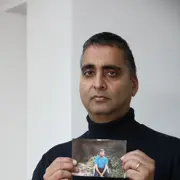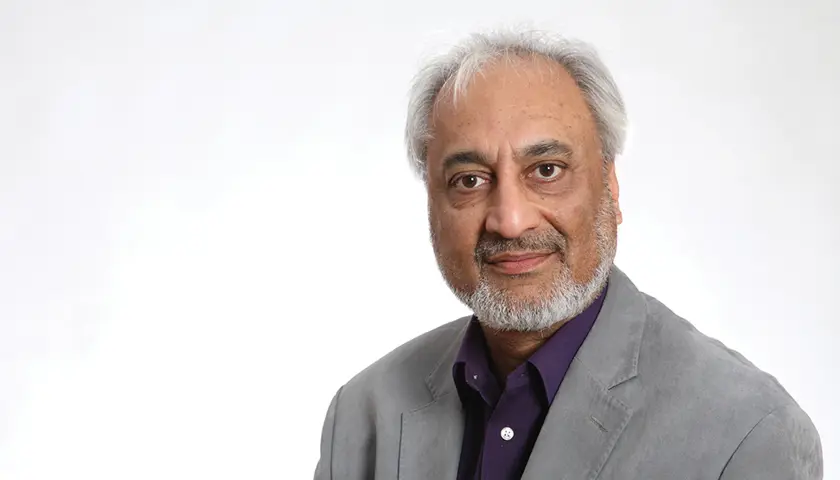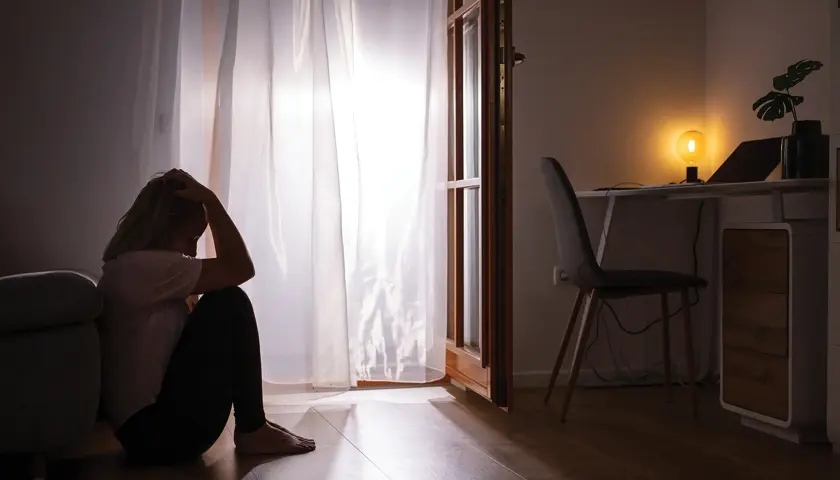
Lives cut short
A new impetus to reduce suicide should include urgent improvements to workplace culture, as well as help with the cost of living.
‘It is the biggest risk we face – and the biggest concern for all of us working in suicide prevention.’
Professor Louis Appleby, possibly the country’s leading expert in the field, pulls no punches when The Doctor asks for his assessment of the links between economic crises and suicide, and whether the cost-of-living crisis risks undermining efforts to reduce tragedies.
‘Every major economic downturn has put up the suicide rate historically in the UK and in other countries,’ he says. ‘There’s no question it’s our biggest concern but that doesn’t mean it is inevitable.’
It is a critical question for the UK in 2023. The cost-of-living crisis dominates headlines in the media and the worries of people across the country.
So, if there has historically always been a link between economic crisis and increasing suicide rates, what does Professor Appleby mean when he says ‘not inevitable’?
‘When you look at what happened after 2008 some countries did better than others,’ he says.
‘It tends to be countries which had policies of social support and employment support. So, preventing people losing their jobs or, at least, getting into serious debt if they did. That kind of economic policy is difficult for governments because it’s costly. But it’s what happened during COVID with the furlough scheme, and it’s probably one of the reasons why the suicide rate didn’t rise during COVID, even though everybody thought it would.
‘Criticising governments is easy – it’s a national sport. But on the other hand, there have been measures to support people through energy bills, and other support. And I just think that we have to keep in mind that the effect of the cost-of-living crisis won’t be over soon. The protections that people might need will be long term.’
Deprivation risk
These are exactly the sorts of questions and considerations posed by a BMA report – Suicide prevention during economic crises: a UK approach – which makes a host of recommendations in terms of preventing suicide in the general population, but also specifically among doctors working in the NHS.
It could hardly be a more pressing issue. In 2021, there were 5,219 registered deaths in England alone from suicide, which equates to 14 people dying by suicide every day. Suicide is the leading cause of death in England for adults under 35. Economics and poverty play a crucial role, too.
Those who live in the most deprived areas are at the highest risk. And a 2023 survey of more than 5,000 people found that nearly 80 per cent said their mental health had been affected by the current cost-of-living crisis. In the space of just over six months in 2022, one charity reported a 196 per cent increase in people seeking their help with suicidal thoughts.
The report calls for urgent action on the dominant factors causing suicide – calling for a ‘mental health in all policies’ approach to policy making, including a mental health impact assessment for all new proposals.
It is a demand which was taken into account in the Government’s recent suicide prevention strategy for England, driven by Professor Appleby who is chair of the national suicide prevention strategy advisory group. Among 100 proposals, covering a broad range of areas, the Government has committed to carrying out mental health impact assessments as part of policy processes. Here, actions will speak louder than words, but the promise itself is laudable.
Professor Appleby cites recent policy in areas such as prisons or welfare, which would now have an extra lens of scrutiny. He says: ‘It’s very important for me… When new Government policies come through they are assessed against the likelihood that they will have an impact on mental health and suicide risk.’
Workplace support
The BMA report also calls for collaborative efforts across Government departments to prioritise mental health and suicide prevention to protect the population’s health in the current economic climate and in future.
It also urges adequate support in all workplaces, including the NHS – including provisions such as rest spaces, management training around wellbeing, comprehensive, confidential and timely occupational health services, a healthy and flexible work-life balance and the implementation of reasonable adjustments wherever necessary.
The report also calls for stigma around mental health to be a priority and all suicides associated with workplace stress to be investigated in the workplace.
Consultant psychiatrist and BMA lead on suicide prevention JS Bamrah says many of these issues are particularly important for doctors and the NHS. Not only does the health service often bear the brunt of economic crises through under-funding and the increased need in communities, but it can also be a notoriously pressurised and unsupportive working environment which takes a toll on the wellbeing of staff.
He says: ‘We know at the moment in the workplace in the NHS there’s lots of bullying and harassment and some places are toxic. If we are not looking after the people who look after people then that’s a very sad story.
'So, we are saying there should be adequate support for doctors and nurses and we’re putting the onus on employers and bosses to make sure that happens. There’s massive burnout, there’s massive work-related stress and many people are heavily mentally fatigued from the pandemic.’
He adds: ‘We need to address the stigma around mental health and suicide and we need to have a system where we look at the suicide of every person, of every doctor. Suicide from work-related stress should be a never event.’
In the NHS there’s lots of bullying and harassment and some places are toxic
JS Bamrah
Amandip Sidhu founded charity Doctors in Distress after the death of his cardiologist brother Jagdip Sidhu in 2018. Dr Sidhu worked to the point of burnout and took his own life.
The charity now seeks to raise awareness that doctors suffer from the same illnesses as the patients they treat and campaigns for better support for staff.
Mr Sidhu believes doctors are vulnerable to suicide for many, complex, reasons including a lack of focus on personal wellbeing in medical schools and training, a total lack of compassionate leadership and support systems in workplaces which compound feelings of isolation and a major sense of stigma around vulnerability and perceived weakness.
He says: ‘Doctors are trained to be seen as indestructible. We all want our doctors to be perfect because our health is in their hands but doctors have the same physiology as all of us – they go through the same life experiences and they have the same vulnerabilities.’
Mr Sidhu says: ‘I’m not an expert on the NHS but one thing I realised very quickly through my work is that our health service has only survived because of the very strong goodwill from people who work in it.
‘If I had a magic wand, I would do three things: firstly, I would give, to the best of my abilities, the right resources to doctors and healthcare workers to allow them to do the job they want to do.
‘Secondly, we need to make the workplace an enjoyable and happy place to work, with a supportive and nurturing environment. Simple things like giving [staff] time off when they want it and having rotas well in advance make a difference.
‘And, thirdly, is having a compassionate workplace culture where people have proper access to mental health support and wellbeing services – not just tick-box things but meaningful services.’
‘Moral poverty’
The new Government strategy pulls together more than 100 measures which it suggests can reduce England’s suicide rate within the next two-and-a-half years. The plans include an ‘alert system’ which aims to notify relevant authorities such as schools and charities of emerging methods of suicide and risks, fresh guidance to first responders, ‘near real-time surveillance’ of trends in suicides nationally to drive ‘targeted actions’ and a pledge to stop the supply of dangerous and lethal substances.
The strategy also includes action in various areas of mental healthcare including a plan to give millions more children in schools access to a dedicated mental health support team by March 2025.
Professor Appleby says: ‘It really matters to me… It’s an important statement about how necessary it is as a set of services, as a country and as a society that suicide prevention is taken seriously.’
While the efforts of campaigners such as the BMA and individual policies such as those announced in the recent Government strategy represent progress and welcome focus, Professor Appleby is clear there are also wider issues about how our society works and what sort of a country we want to be, which can have a huge effect in this area.
Suicide from work-related stress should be a never event
JS Bamrah
Echoing Durkheim’s theories about ‘moral poverty’ as a driver for suicide which have rung true for more than a century, he says: ‘We have to be prepared to take on the idea that society’s values – the way that it works – are an important part of people feeling safe.
‘Of course that doesn’t mean that everybody is likely to be at risk of suicide. But it does mean that if you’ve got a society where some people are already vulnerable for different reasons and you add to that a sense of loss of hope, that there’s nothing here for me, that the future doesn’t hold much, that could put some people at risk.’
He adds: ‘If people feel their values are reflected in how society is run then that ought to be a more psychologically safe society.’
Staying safe
Alys Cole-King, retired consultant liaison psychiatrist and clinical director of 4 Mental Health, explains how having a ‘Safety Plan’ can help
'Although devastating, suicide is not the inevitable outcome of suicidal thoughts. One practical step is to make a Safety Plan. This is a list of things people can do to help themselves, and sources of support if they’re struggling.
'It is like the emotional health equivalent of putting on a car seatbelt. We put on our seatbelt at the start of a journey, not at the point of collision. Ideally, a person makes their Safety Plan when they are calm and not in crisis, when it’s easier to think clearly. However, it’s never too soon to make a Safety Plan and it’s never too late. StayingSafe.net is 4 Mental Health’s free website to equip people to make a Safety Plan.
'As an overwhelmed brain needs simple and easily accessible information, a Safety Plan has a clear, step-wise structure. It is designed to help someone safely navigate intense feelings and can help interrupt suicidal thoughts or plans and stop things ‘spiralling out of control'.
'It starts with the most helpful, easy or quick self-help strategies, culminating in 24-hour emergency professional crisis support. When people struggle, they can lose the ability to generate and evaluate possible solutions. They may feel the only option is to end their life. A Safety Plan provides a road map to navigate these feelings.
'A Safety Plan has several sections and uses a person’s strengths and assets. Initially it involves self-help, ways to make their situation safer and then includes support from others, culminating in 24-hour emergency, professional, crisis support.
'A Safety Plan is so much more than a piece of paper or an app. It can also act as a reminder of calmer times, hope that things can improve, reasons for living and the important things in life. When a Safety Plan is co-produced with someone else, it acts as a tangible reminder of the compassionate connection, shared hope and support they received from that person. So it can also act as a golden thread back to the time when the patient felt validated, calmer and less distressed. This sharing of hope can help them see the light at the end of the tunnel and that things can get better.
'Having a Safety Plan can empower a person to feel more confident that they can get through tough times. It can remove some of the fear around recurrent suicidal thoughts or crises, for them and for their loved ones. It can also help them to stay safer, even at 3am in the morning when they are struggling with suicidal thoughts.'
Photo of Amandip Sidhu by Sarah Turton





